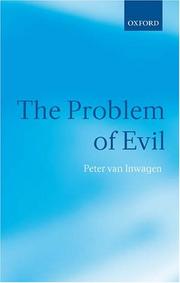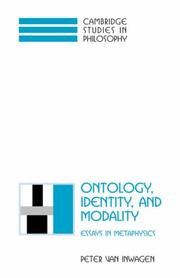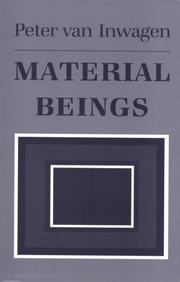| Listing 1 - 10 of 32 | << page >> |
Sort by
|

ISBN: 9780199245604 0199245606 0199543976 019171531X 9786610904709 1280904704 1435622421 0191529729 9786611515256 1281515256 0191562521 9780191529726 9780199543977 Year: 2008 Publisher: Oxford Oxford University Press
Abstract | Keywords | Export | Availability | Bookmark
 Loading...
Loading...Choose an application
- Reference Manager
- EndNote
- RefWorks (Direct export to RefWorks)
The vast amount of suffering in the world is often held as a particularly powerful reason to deny that God exists. Highly accessible and carefully argued, Peter van Inwagen's book maintains that such reasoning does not hold, and that suffering should not undermine belief in God. - ;It is generally supposed that the fact that the world contains a vast amount of suffering, much of it truly horrible suffering, confronts those who believe in an all-powerful and benevolent Creator with a serious problem: to explain why such a Creator would permit this. Many reflective people are convinced that the
General ethics --- God -- Proof. --- Good and evil -- Religious aspects -- Christianity. --- Good and evil. --- Theodicy. --- Ethics --- Christianity --- Religion --- Philosophy --- Philosophy & Religion --- God --- Good and evil --- Theodicy --- Proof --- Religious aspects --- Evil, Problem of (Theology) --- Permissive will of God --- Problem of evil (Theology) --- Evil --- Wickedness --- Polarity --- Religious thought --- Religious aspects&delete& --- Permissive will --- Will, Permissive --- Proof. --- Christianity.
Book
ISBN: 0198751400 9780198751403 Year: 1993 Volume: vol *2 Publisher: Oxford: Oxford university press,
Abstract | Keywords | Export | Availability | Bookmark
 Loading...
Loading...Choose an application
- Reference Manager
- EndNote
- RefWorks (Direct export to RefWorks)
Metafysica --- Metaphysics --- Métaphysique --- --Métaphysique --- --Metafysica --- --Metaphysics
Book
ISBN: 9781107625266 9781107047129 9781107111004 1107625262 1107047129 1107111005 1139699261 1139862316 Year: 2014 Publisher: Cambridge Cambridge University Press
Abstract | Keywords | Export | Availability | Bookmark
 Loading...
Loading...Choose an application
- Reference Manager
- EndNote
- RefWorks (Direct export to RefWorks)
The problem of the nature of being was central to ancient and medieval philosophy, and continues to be relevant today. In this collection of thirteen recent essays, Peter van Inwagen applies the techniques of analytical philosophy to a wide variety of problems in ontology and meta-ontology. Topics discussed include the nature of being, the meaning of the existential quantifier, ontological commitment, recent attacks on metaphysics and ontology, the concept of ontological structure, fictional entities, mereological sums, and the ontology of mental states. Van Inwagen adopts a generally 'Quinean' position in meta-ontology, yet reaches ontological conclusions very different from Quine's. The volume includes two previously unpublished essays, one of which is an introductory essay where van Inwagen explains his conception of the relation between the language of 'the ordinary business of life' and that of 'the ontology room'. The volume will be an important collection for students and scholars of metaphysics.
Ontology --- Ontologie --- Substance (Philosophy) --- Ontology.

ISBN: 0198246242 0198249241 Year: 1983 Publisher: Oxford : Clarendon press,
Abstract | Keywords | Export | Availability | Bookmark
 Loading...
Loading...Choose an application
- Reference Manager
- EndNote
- RefWorks (Direct export to RefWorks)
Free will and determinism --- Libre arbitre et déterminisme --- Compatibilism --- Determinism and free will --- Determinism and indeterminism --- Free agency --- Freedom and determinism --- Freedom of the will --- Indeterminism --- Liberty of the will --- Determinism (Philosophy) --- Free will and determinism. --- Libre arbitre et déterminisme

ISBN: 0521791642 0521795486 9780521795487 9780521791649 Year: 2001 Publisher: Cambridge : Cambridge university press,
Abstract | Keywords | Export | Availability | Bookmark
 Loading...
Loading...Choose an application
- Reference Manager
- EndNote
- RefWorks (Direct export to RefWorks)
Ontology. --- Identity (Philosophical concept) --- Modality (Theory of knowledge) --- Ontology --- Being --- Philosophy --- Metaphysics --- Necessity (Philosophy) --- Substance (Philosophy) --- Knowledge, Theory of --- Identity --- Comparison (Philosophy) --- Resemblance (Philosophy) --- Modalité (logique) --- Ontologie --- Identité

ISBN: 9780801483066 9780801419690 0801483069 0801419697 1501713027 1501713035 9781501713033 9781501713026 Year: 1990 Publisher: Ithaca, NY London Cornell University Press
Abstract | Keywords | Export | Availability | Bookmark
 Loading...
Loading...Choose an application
- Reference Manager
- EndNote
- RefWorks (Direct export to RefWorks)
03 According to Peter van Inwagen, visible inanimate objects do not, strictly speaking, exist. In defending this controversial thesis, he offers fresh insights on such topics as personal identity, commonsense belief, existence over time, the phenomenon of vagueness, and the relation between metaphysics and ordinary language
Ontology. --- Identity (Philosophical concept) --- Ontologie --- Identité --- Ontology --- Identity --- Philosophy --- Comparison (Philosophy) --- Resemblance (Philosophy) --- Being --- Metaphysics --- Necessity (Philosophy) --- Substance (Philosophy)

ISBN: 1501713027 1501713035 9781501713033 0801483069 Year: 1990 Publisher: Ithaca, NY
Abstract | Keywords | Export | Availability | Bookmark
 Loading...
Loading...Choose an application
- Reference Manager
- EndNote
- RefWorks (Direct export to RefWorks)
03 According to Peter van Inwagen, visible inanimate objects do not, strictly speaking, exist. In defending this controversial thesis, he offers fresh insights on such topics as personal identity, commonsense belief, existence over time, the phenomenon of vagueness, and the relation between metaphysics and ordinary language
Identity (Philosophical concept) --- Ontology. --- Identity --- Philosophy --- Comparison (Philosophy) --- Resemblance (Philosophy) --- Being --- Metaphysics --- Necessity (Philosophy) --- Substance (Philosophy)
Book
ISBN: 1316731162 1316711102 1316733092 1107166500 1316617653 Year: 2017 Publisher: Cambridge, England : Cambridge University Press,
Abstract | Keywords | Export | Availability | Bookmark
 Loading...
Loading...Choose an application
- Reference Manager
- EndNote
- RefWorks (Direct export to RefWorks)
Peter van Inwagen, author of the classic book An Essay on Free Will (1983), has established himself over the last forty years as a leading figure in the philosophical debate about the problem of free will. This volume presents eleven influential essays from throughout his career, as well as two new and previously unpublished essays, 'The Problem of Fr** W*ll' and 'Ability'. The essays include discussions of determinism, moral responsibility, 'Frankfurt counterexamples', the meaning of 'the ability to do otherwise', and the very definition of free will, as well as critiques of writings on the topic by Daniel Dennett and David Lewis. An introduction by the author discusses the history of his thinking about free will. The volume will be a valuable resource for those looking to engage with van Inwagen's significant contributions to this perennially important topic.
Book
ISBN: 9780192883964 Year: 2023 Publisher: Oxford Oxford University Press
Abstract | Keywords | Export | Availability | Bookmark
 Loading...
Loading...Choose an application
- Reference Manager
- EndNote
- RefWorks (Direct export to RefWorks)
'Being' presents and defends a meta-ontology and an ontology. Peter van Inwagen offers answers to the ontological question 'What is there?' and to the questions of meta-ontology: 'What is it to be (or to exist)?' and 'How should one attempt to answer the ontological question?'
Ontology. --- Metaphysics
Book
ISBN: 9780813343563 0813343569 Year: 2010 Publisher: Boulder: Westview press,
Abstract | Keywords | Export | Availability | Bookmark
 Loading...
Loading...Choose an application
- Reference Manager
- EndNote
- RefWorks (Direct export to RefWorks)
This essential core text introduces readers to metaphysics. In thoughtful and engaging prose, Peter van Inwagen examines three profound questions: What are the most general features of the world? Why is there a world? And, what is the place of human beings in the world? The third edition includes an entirely new chapter on ontology. The new chapter presents a theory of the nature of being and proceeds to apply this theory to two problems of ontology: the problem of non-existent objects and the problem of universals. Equally valuable as a textbook in a university course or an introduction to metaphysical thinking for the interested layperson, Metaphysics remains a fascinating book for a wide range of readers, from first-time students to the most sophisticated philosophers.
| Listing 1 - 10 of 32 | << page >> |
Sort by
|

 Search
Search Feedback
Feedback About UniCat
About UniCat  Help
Help News
News